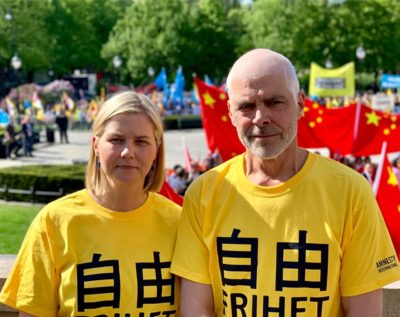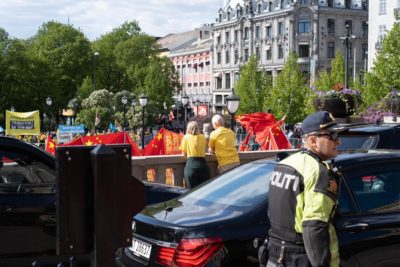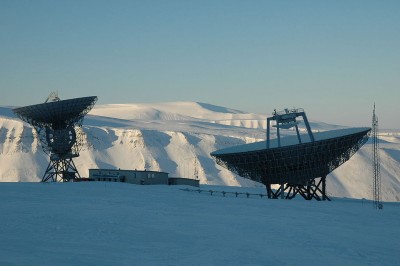NEWS ANALYSIS: What does this man and his Chinese government colleagues want from Norway? Many suspect more influence in the Arctic, lucrative trade deals and tacit acceptance of their authoritarian regime after Li Zhanshu, China’s third most-powerful leader, visited Oslo and Stavanger last week. Protests and angry questions are still flying after both Norwegian and Chinese officials shielded Li and his delegation from public criticism and demonstrations against China’s human rights violations.

Li’s Chinese delegation was met by demonstrations anyway, not least after the president of Norway’s own Parliament was widely viewed as having gone along with Chinese efforts to stymie them. Several Members of Parliament remain deeply disturbed that their president, Tone Trøen of Norway’s Conservative Party, allowed herself to be “manipulated,” resulting in a small but noisy pro-China group securing the best position in front of Parliament.
Other little-known Chinese groups, organized but not registered in Norway under the name of “Norway-Wenzhou Chamber of Commerce,” also set up welcome committees and waved Chinese flags when Li’s motorcade, for example, drove past the Frogner Park on Thursday. Norwegian police were also out in force, both along Li’s transit routes and not least at the Parliament, to make sure there were no unpleasant incidents.

Chinese leaders are said to be so sensitive to criticism, and so threatened by any attempt to question their authority, that Norwegian officials seemed to allow efforts to restrict freedom of expression. Organizations including Amnesty International Norway, The Norwegian-Tibet Committee and The Norwegian Uighur Committee shouting “Shame on China” and “human rights now” were kept at a distance from Li and his delegation.
Members of Parliament Petter Eide of the Socialist Left party (SV) and Guri Melby of the Liberal Party, meanwhile, were stunned when they were physically blocked from appearing near Li when he arrived at Parliament, because they were wearing yellow T-shirts emblazoned with Frihet (Freedom) on them.

Things got worse when Melby, whose party is a member of Norway’s government coalition, was even prevented from re-entering the Parliament Building after Li’s delegation was inside. “‘You can’t meet the Chinese delegation with that T-shirt,'” Melby claims she was told by the Parliament’s own security guards. “When I proposed taking off the T-shirt myself, then I could go in. I think that was very strange.”
Trøen, who as president of the Parliament ranks second only to the monarch in Norway, tried to fend off questions about the incident the next day by claiming security concerns. Eide was outraged and Melby vowed to pursue the matter. She wants more clarification as to why her own freedom of expression in Norway’s own national assembly was hindered.

“It’s quite clear that this isn’t about security, but that it’s about concerns it could have been uncomfortable for them (the Chinese),” Melby told TV2 just before the weekend, and just as Trøen and most other Norwegians were celebrating Norway’s democracy and constitution on the 17th of May. The paradox was glaring.
Trøen wouldn’t disclose the nature of her officials talks with Li, nor would Prime Minister Erna Solberg, leading others to fear the two didn’t directly take up Norwegian concerns over the detention of China’s Uighur minority, increasing control and surveillance of Chinese citizens, and sudden disappearances of human rights advocates viewed as challenging the authority of their communist leaders.
Norway claims to be among the world’s biggest advocates of human rights, freedom and democracy, but is often criticized for being reluctant to criticize Chinese censorship and crackdowns on individual liberty. Pragmatic Norwegian leaders don’t want to risk setting off another diplomatic freeze, like the one China launched in anger after the Norwegian Nobel Committee awarded the Nobel Peace Prize to Chinese dissident Liu Xiaobo in 2010. Liu later died without ever being allowed to receive his prize.

Many Norwegians believe this damages the integrity of their own leaders. MPs Melby and Eide had support from other MPs from government parties, including Abid Raja and Ketil Kjenseth of the Liberals. A local Progress Party official in Stavanger was also among critics who did not welcome the visit by Li and his delegation.
There’s little doubt that China has become even more of a Communist Party-run and restrictive state since Xi Jinping consolidated his power and may hang on to it for as long as he lives. Harald Bøckman, professor at the University of Oslo who’s now a guest researcher at the London School of Economics and Political Science, wrote in newspaper Aftenposten last week how the party has strengthened its direct control over the state.
Chinese ambitions in the Arctic
Now it’s widely believed that top party officials like Li not only want trade deals with Norway, which is small but extremely wealthy because of its oil, gas and seafood resources, but influence in the Arctic as well. Norway has long been a major player in the Arctic because of its own Arctic territory, its familiarity with and knowledge of the area and its role as NATO’s “eyes and ears” in the vast region that borders on Russia. Norway helped China gain observer status on the Arctic Council in 2013, hoping that might mend ties in the midst of their diplomatic freeze. It would take another three years before China restored relations, mostly on its terms.

China has also been allowed to set up a so-called “research station” on Svalbard, which is international territory but under Norwegian administration. Now China clearly is keen to be able to use the new seasonal shipping lanes that are emerging north of Russia as the Arctic ice melts. The route can cut transit time between China and Europe bu as much as two week.
China’s Communist Party leader and president Xi has been pushing his “New Silk Road” project with other countries, but researchers note that it also can lead to establishment of military bases in the areas where China funds transport infrastructure. “We shouldn’t be naive,” one Norwegian expert told Norwegian Broadcasting (NRK) last week during public discussions of why Li came to Norway. Officially he was mostly following up on last year’s state visit to China by Norway’s king and queen.
Cooperation may backfire
Torbjørn Pedersen, a professor at Nord Univerity in Tromsø, suggests that Norway’s willingness to cooperate in the field of Arctic research may backfire. “International polar research makes several nations, including China, able to operate with military forces in the Arctic,” warned Pedersen in a commentary in Aftenposten earlier this month.
The Arctic, he notes, has been one of the world’s “most demanding and exclusive” environments in which to operate. Only a few players (Norway included) have traditionally had experience and knowledge tied to operating in such an extreme environment. New research published in the Arctic Review on Law and Politics, Pedersen wrote, shows that’s about to change, as data and knowledge that formerly were only in a few hands are now shared internationally.

The dilemma, therefore, is how to balance the exchange of information: International research cooperation can be critical to understanding the climate crisis and ecosystems in the North, Pedersen wrote, “but spreading the data and knowledge can also have an unfortunate security and political side for Norway.”
China, Pedersen wrote, “has already begun charting the Arctic seaway” with its own ice-breaker vessels. A German ice breaker will soon set off on a year-long expedition involving around 600 researchers from 17 countries. Norway has facilitated lots of research already in the Arctic. “Russia is steadily asserting itself in the far north,” he wrote. “According to (Norwegian military intelligence), China can start patrolling the Arctic with marine vessels in a few years. ” He thinks that will contribute “to our part of the world becoming more challenging and unpredictable.”
Norway, until now, has had an advantage in the Arctic: “When differences in knowledge disappear, thanks to more international polar research and cooperation, potential battlefields in the North can be evened out,” Pedersen warns. “Completely new challenges can turn up, and they can be uncomfortable for little Norway.”

Some discomfort has already occurred. For the first time ever, the Arctic Council that includes countries bordering on the Arctic failed to agree on a joint climate declaration after foreign ministers from Norway, Russia, Finland, Sweden, the US, Denmark, Iceland and Canada met in Finland in early May. NRK reported that the US wouldn’t go along with any references to global warming and climate change. Foreign Minister Ine Eriksen Søreide admitted to NRK that she was disappointed that her US counterpart, Mike Pompeo, refused to acknowledge what’s melting the ice.
“We wanted a joint declaration,” Søreide told NRK. “What we got instead is a clear sign from all the ministers persent about the ongoing work of the Arctic Council. It takes up what would have been the content of a declaration.”
Pompeo, meanwhile, claimed in a dinner speech that the US will be boosting its own role in the Arctic. His speech also strongly criticized Russia and China, blaming both countries for “aggressive measures” in the Arctic area.
newsinenglish.no/Nina Berglund

